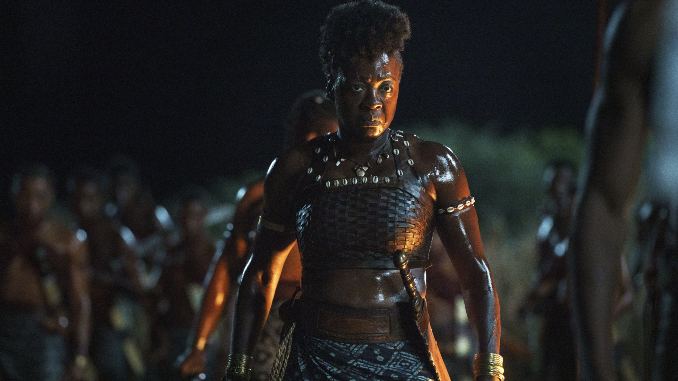Long Live The Woman King

Because The Woman King is “inspired by true events” and stars a predominantly Black and African cast, telling the story of African women soldiers, it feels important before we even know if it’s any good. That could lead to warping expectations or shaping the viewing experience. Luckily, The Woman King is strong enough to shoulder whatever weight is foist upon it in the context of its release. Acclaimed actors portraying women warriors in a 19th-century African kingdom are bound to draw interest in 2022. With Viola Davis as the central figure, Lashana Lynch stealing the show, and John Boyega strutting in director Gina Prince-Bythewood’s homage to African resistance and ‘90s historical epics, The Woman King knows how to keep that interest.
The Woman King splits its narrative to follow two women: Nanisca (Davis), as she leads her all-female soldiers against Dahomey’s enemies in the early 19th century, and young recruit Nawi (Thuso Mbedu), as she finds her place in Nanisca’s Agojie. Nanisca’s top lieutenants are her best friend Amenza (Sheila Atim), the spiritual leader of the Agojie, and Izogie (Lynch) who leads them in training—in addition to filling Nawi full of life lessons and carrying most of the film’s humor. That is, aside from what is delivered by Boyega as King Ghezo, the strutting monarch dealing with contention in his court about how to handle Brazilian-Portuguese traders. Selling their enemies into bondage has made Ghezo’s kingdom rich; Nanisca wants to put an end to it. As one of Ghezo’s trusted advisors, she’s also inspired jealousy from one of his favored wives. The Woman King observes Nanisca’s role leading the Agojie and how that extends to her position in court, injects flashbacks that lead to a quest for revenge, watches Nawi growing as a warrior and a woman, and sprinkles in just a dash of court intrigue.
There are enough plates spinning for high drama or camp, sort of like the way Legends of the Fall piles on tragedy after tragedy, but considerably more fun. Nonetheless, The Woman King always stays on the right side of serious at its core with small bits of comedy that feel earned. There’s enough going on to approach bloatedness, but storylines coalesce and cohere around the material conditions of the kingdom—caught between Portuguese slave traders and a rival African nation—grounding the individual characters and determining their relationships with one another. It sometimes feels like the The Woman King’s inability to decide whether Nanisca or Nawi is the protagonist makes it too much to work, too much piled on, but their contrasting experience levels keep everything straight—though that contrast also engenders tricky tonal shifts. But our perspective is always sound, reinforced by language: When characters speak English, it is a stand-in for Fon, but whether Portuguese is subtitled depends on context.
The Woman King comes up against a version of the “prequel problem,” by ending with a West African nation triumphing against European interlopers. It’s worth reading what happened next, but it won’t make the film any better. Dahomey pushed out the Oyo Empire, but they continued to trade in slaves. The Portuguese were eventually replaced by the French, who conquered the whole area by the beginning of the 20th century, ending Dahomey independence. But Gladiator isn’t worse off because Rome fell and Glory still holds meaning despite modern conservative revanchism. The Woman King is still a valuable movie.
Much like Black Panther, a movie that The Woman King may draw flattering but inadequate comparisons to, one of its core contentions is the responsibility of the king to his neighbors. Part of Nanisca’s arc with Ghezo is that she wants him to stop the slave trade; she wants the king to expand his idea of who his people are beyond their borders when it comes to dealing with the Europeans. Her solution to maintain prosperity is to create palm oil, but I’m not sure if the film expects us to believe that’s what happened. The Woman King doesn’t have time or space to confront that failure, and where it leaves off feels good, almost like a peek at how things might have been different for Africa in the 19th century, if not for the millions of African slaves that were already in the Western Hemisphere.
-

-

-

-

-

-

-

-

-

-

-

-

-

-

-

-

-

-

-

-

-

-

-

-

-

-

-

-

-

-

-

-

-

-

-

-

-

-

-

-








































